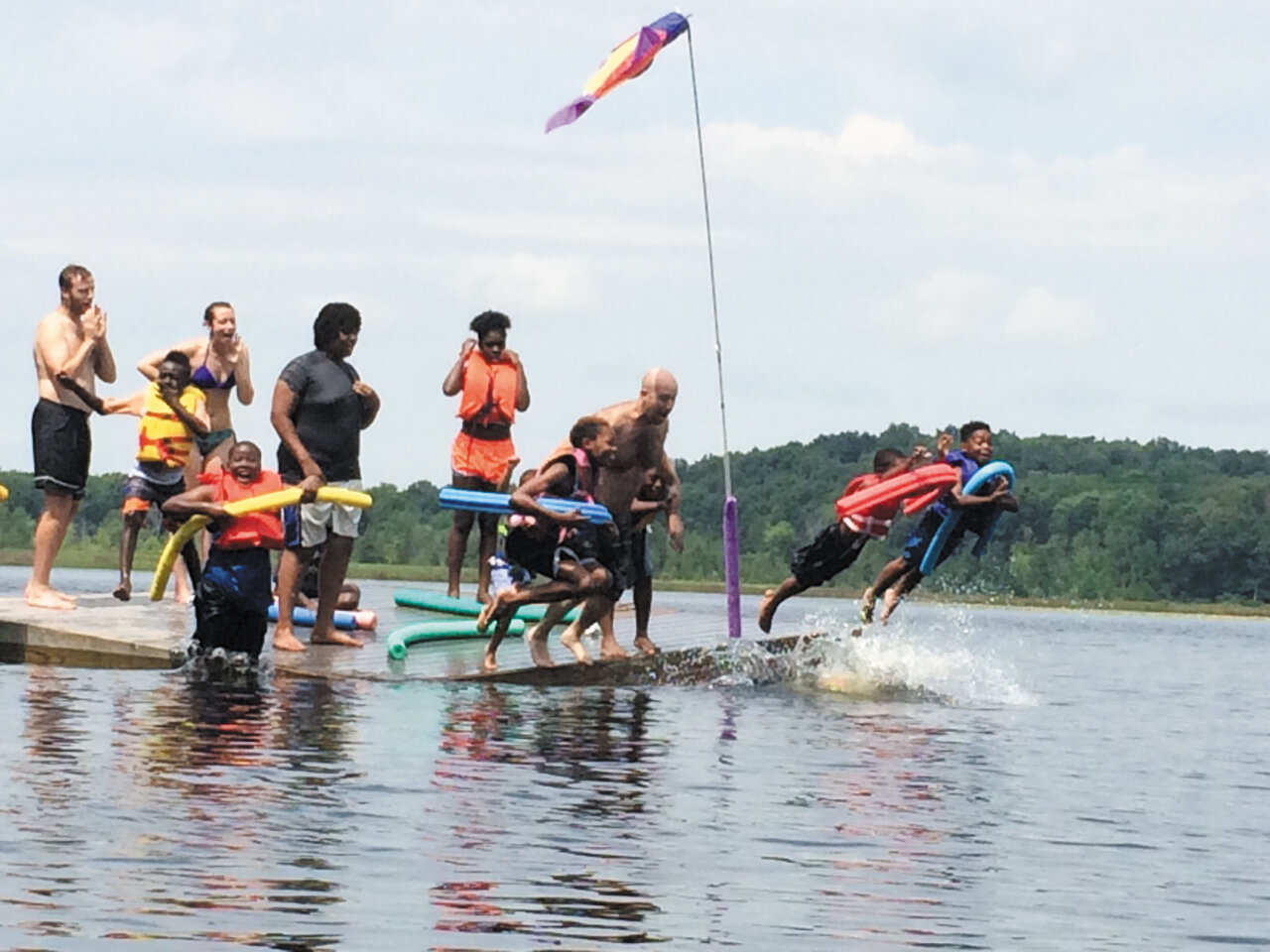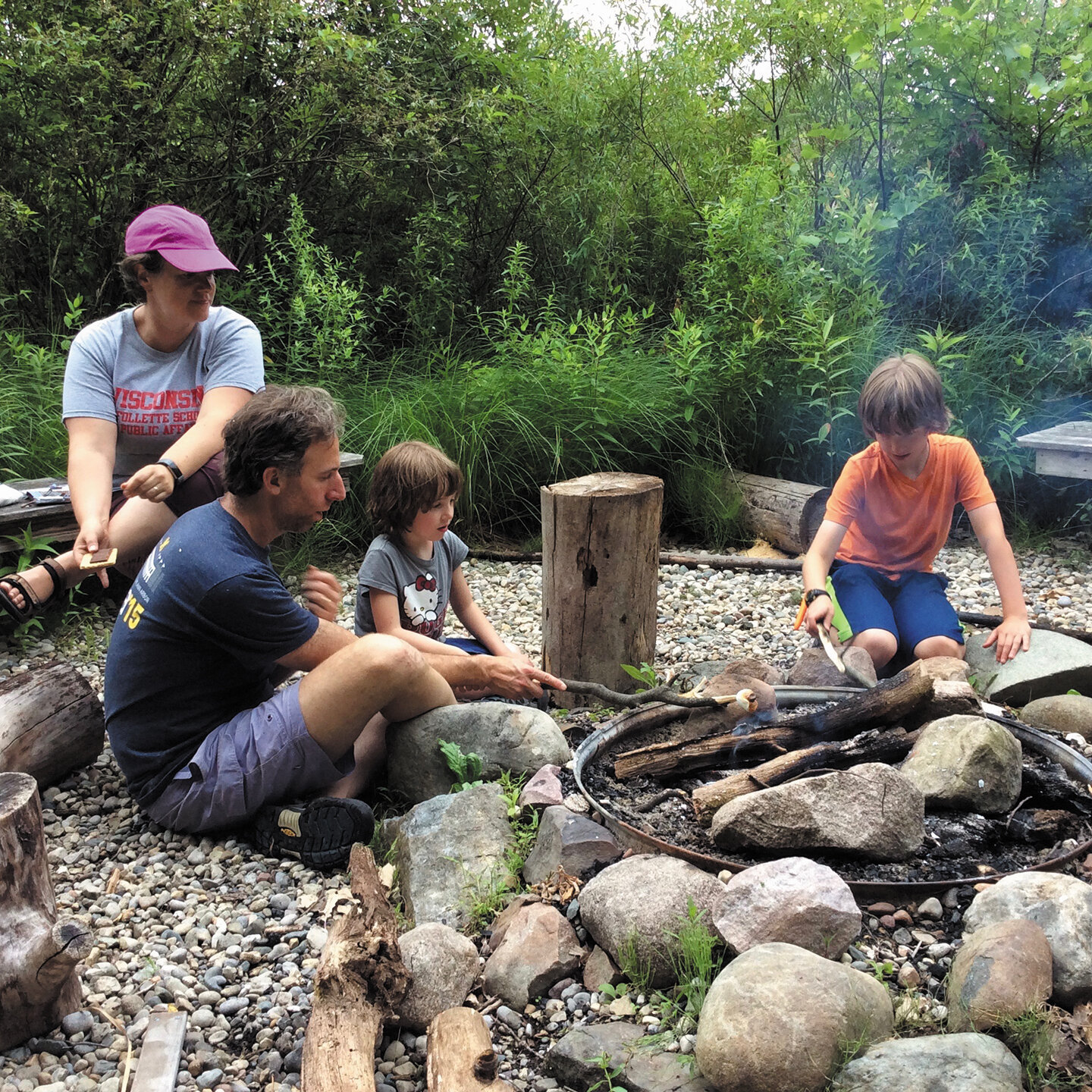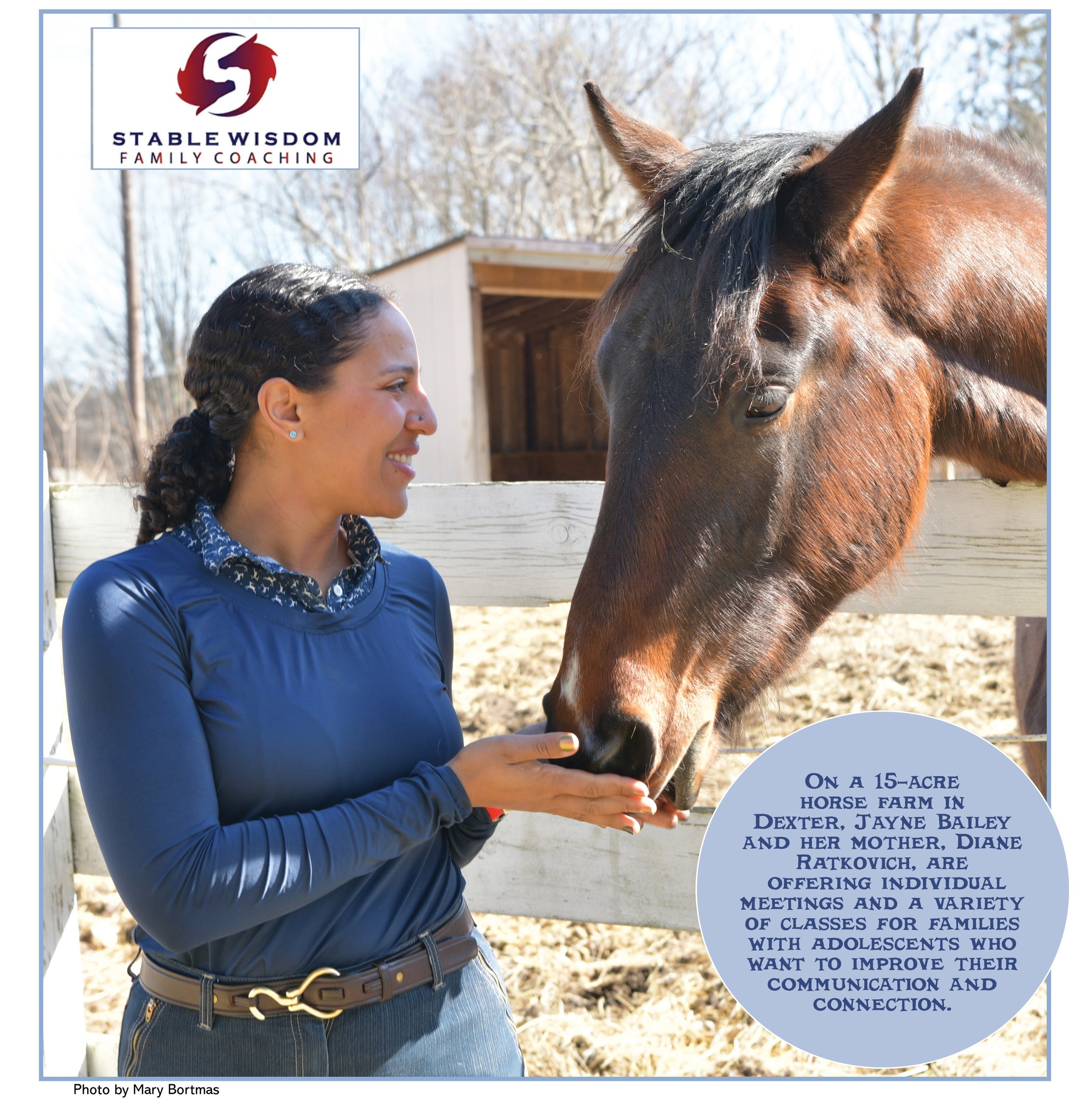By Ann Rosegrant Alvarez
Places that hold great spiritual energy and history have a special feel to them. For decades, it has been our family practice to pause and open our windows when we turn onto the dirt road that leads into the Friends Lake Cooperative Community. This is partly to inhale the smell of the pine trees near the entrance, and partly to feel the spirit of the place, and the immediate sense of refuge and relaxation it brings us.
As we drive slowly down the lane, we pass the meadow on our right. The open field features a huge tree near one end, a fitting focal point for a ceremony or ritual. Just past that, the Michigan Friends Center appears on our left. We continue on, past the campground, down the winding slope, until we end up in the parking lot, at the end of the road. From here, we get out and walk between modest cabins, add our names to the sign-in sheet, and head into the open area bordered by a brick pizza oven, firepit, play structure, sauna, and a lakeside log cabin with boating equipment. Picnic tables dot the grassy area, and the children’s beach, boats, and dock edge the lakeshore.
If it’s summer, we leave our things on a picnic table and head over to the adult swim area. Some of us swim the length of the lake and sun lazily on one of two rafts afterward. Others poke around in the shallows, riding “noodles” and bobbing with the water’s movement. Ahhhhh! Friends Lake! We breathe deeply, and feel muscles relax and tension seep away. If kids are with us, some of us linger with them at the children’s beach area. This small, shallow area has a sandbox on shore, and endlessly fascinating fish come right up to the children–it’s hard to know which group stares harder at the other! Later, we eat what we brought and chat with other visitors to the lake, and when we head homeward again, it is with lighter hearts and spirits, and the sense of being refreshed and rejuvenated.
Friends Lake is actually the shorthand name for Friends Lake Cooperative Community (FLCC), set on the shore of Long Lake, a little northwest of Chelsea but still in Washtenaw County, and adjacent to Waterloo State Recreation Area land. Members feel very fortunate to have access to this natural resource and space without having to drive several hours “up north.” As its website explains, “Friends Lake Cooperative Community is owned and operated cooperatively by its members. The name reflects its origin when a group of Quaker families bought 70 acres in 1961. Two years later they started this cooperative community, emphasizing simplicity, ecology, and caring. It was created for persons of every faith and color, a serene setting for harmony with nature where the joy of life is celebrated and where decision-making reflects a search for spirit-led action.”
Read related article: Hidden Gems: Green Spaces You Might Not Know About, but Need to Explore!
The original Articles of Incorporation, filed in March of 1963, were signed by eight people important in the Ann Arbor community and beyond: Robert Blood, Elise and Kenneth Boulding, Johan Eliot, Herman Frinkle, Eldon Hamm, Benton Meeks, Peter Wenck, and Claudia Winder. Longtime Ann Arborites will recognize many of these names. Johan Eliot, for example, was medical director of Planned Parenthood in Ann Arbor, and a physician at the Ann Arbor Free People’s Clinic. Like other founders, both Bouldings were devoted members of the Religious Society of Friends (Quakers), and both were prominent peace activists. In fact, Elise Boulding is sometimes referred to as the “Matriarch of Peace and Conflict Studies.” The Bouldings secured the property by making the initial purchase, with plans in place for repayment from the community. The plan included capitalization from the lease of cabin sites and homesites on the property; several cabins are still scattered along an interior road, owned and maintained by committed FLCC members. In the mid-80s, FLCC officially became a “cooperative,” a structure and language that aptly reflect the ways members interact with one another and FLCC.
More than 50 years after its beginning, FLCC retains the same values, with an emphasis on natural simplicity and community. Formerly leased homesites that dot the perimeter of the property are now owned by the homeowners, who have been stalwart stewards of FLCC over the years, and the now more than 70 contiguous acres encompass great biodiversity, including lakeshore, meadow, marsh, and forested areas. While the lake and the water are the main draw for many members, others are drawn to the camping, and there are plenty of options for those who focus on forest bathing.
Unlike a membership at a typical summer lake or swim club, the FLCC membership term includes access to the lake and land over the entire year and during all seasons—a huge asset during these constrained pandemic times. In 2020, new and returning members combined added up to more than a 50% increase in membership numbers. This is likely due in large part to people’s need for a place to be away from home, out in nature, and with clear Covid-related protocols, and no large crowds.
Many members view FLCC as an idyllic haven. Cassie Cammann, a longtime member and Friend, succinctly sums of the value of FLCC as, “The opportunity to be in nature, in water, and in community.” It is not for everyone, though. FLCC has no paid staff, and each member is expected to contribute four hours of labor to the community per year, or to pay in lieu of that work. Members participate on committees, do physical work to maintain and improve the property and facilities, plan programs, and staff the board. Decision-making is grounded in the Quaker approach of finding the “sense of the meeting.” Unlike at local public beaches, there is no large sandy beach for sunning, and the swimmer or wader is met with typical lake flora and fauna, including water lilies, fish, and turtles. There is no running water on the property except at the Michigan Friends Center, and buildings, including a few very basic outhouses, are the epitome of “rustic.” There is no smoking, no alcohol in community areas, and no loud music (or Zoom meetings!). While dogs are welcome at FLCC, leashes are required or encouraged, depending on time and place. The property has been designated a wildlife preserve, and there is no sport fishing, and no fishing at all from shore or docks. Children are encouraged to observe and learn about fishes, snails, turtles, birds, caterpillars, fireflies, and any other living creatures—but not to handle or collect them. The focus is on maintaining an atmosphere of mutual respect, within which everyone can enjoy peace and natural beauty. For some people, this all conjures up images of a heavenly retreat.
The original vision of FLCC founding members included a lodge where people could meet for worship, recreation, or educational programs. This part of the vision was actualized when the Michigan Friends Center (MFC) was built near the entrance on FLCC land, following a 1992 agreement between FLCC and Green Pastures Quarterly Meeting. While MFC and FLCC are separate entities, they maintain a close and reciprocal relationship. MFC members and programs make use of FLCC land and facilities, and FLCC members attend programs at MFC, where many FLCC meetings—including board meetings—are also held. Their boards are separate, but many people have served on both, and have strong ties to each organization. The beautiful and peaceful space at MFC, enhanced by its natural setting, is used for conferences, retreats, meetings, and other gatherings. Past programs at FLCC and/or MFC have included potlucks and fire circles at the beach, mindfulness walks, discussion of poetry of nature and spirit, singalongs with local folksinger duo Gemini, and winter gatherings with sledding and skating on the frozen lake.
During the last Bird Walk and Count led by Juliet Berger, Natural Area Preservation Ornithologist and President of the Washtenaw Audubon Society, in June 2019, Berger and the group identified 45 species of birds in two hours including the Hooded Warbler, a State of Michigan Listed Species of Special Concern. Birds listed last year include Acadian Flycatcher, Wood Thrush, Barred Owl, Bald Eagle, Scarlet Tanager, and a pair of Pileated Woodpeckers! Early and late in the day, the lovely and strange calls of weirdly prehistoric-looking Sandhill Cranes float over the lake.
Longtime members Pam and Phil Hoffer are Friends who have enjoyed the beauty and peace of Friends Lake for decades with their daughters, and now their grandchildren. Hoffer shares the following:
I grew up allowed to wander alone for hours in a vast wood in Dover, Massachusetts. It was a huge blessing. When I first came to Friends Lake, I saw a similar wood for our kids to feel safe in, to wander in, to know, to climb the same kind of white pines I did. And with swimming, to boot! Joining was a no-brainer. We have been members since 1979... sharing grunt work on property as well as committee work on membership, [and] organizational work as President and Secretary. Special pleasures: walking in these woods in all seasons, having learned to swim distances unafraid, and now the joy of grandkids having learned the forest paths so well they know where they are in every part. And still my favorite: shared grunt labor with others who love this place. I do think the shared sweat on work projects makes for the glue that binds us together and gets us through [difficult] …times…
Hoffer adds a quote from Albert Schweitzer that she feels captures the spirit of Friends Lake
“By having a reverence for life, we enter into a spiritual relationship with the world. By practicing a reverence for life, we become good, deep, and alive.”
While there are definite commonalities and areas of overlap, different people have varied perceptions of FLCC, and different ways of expressing what most resonates with them. Richard Tucker, currently the Clerk of the Michigan Friends Center, is a recent past-President of FLCC, environmental historian, and self-identified “amateur landscape ecologist.” A member at FLCC since 1966, he emphasizes its land stewardship aspects—an awareness of the responsibility for preserving the unspoiled natural setting and beauty, while managing the resources responsibly. In our interview, Tucker focused on opportunities for environmental education. He described an extensive report done for a U-M Master’s project on how a voluntary community manages its resources, which had two major dimensions: a detailed biological study of the resources, and consideration of how FLCC manages them. Tucker shared that what he most values about FLCC is the opportunity to experience “collective solidarity and ways to relax together in a natural setting with great variety and fascinating history, where we can engage with the issues of environment and climate that challenge us.”
Tucker also referenced the contribution of Amanda Klain, a seasonal botanist for MNFI (Michigan Natural Features Inventory). Klain has worked professionally with the flora of Michigan since 2006 and did a plant inventory of FLCC during 2016-2018. She identified 253 species of trees, shrubs, vines, forbs (herbaceous plants), ferns, grasses, and sedges, including a White Lady’s Slipper—a state-threatened orchid—found just past FLCC boundaries.
Barbara Brodsky is well-known to readers of the Crazy Wisdom Community Journal. Founder of Deep Spring Center, she is an author and meditation teacher who channels the sprit Aaron. She and her husband, Hal, have been members at FLCC since 1969, and their three children—Mike, Davy, and Peter—grew up spending summers at the lake, first camping, and later in their cabin. Interviewed for this article, Brodsky painted a beautiful word picture of the peaceful energy at the lake, and of sitting on the dock watching sunrise and sunset. She emphasized two central aspects of FLCC: the duality of the opportunities for both solitude and community, and the value of the four-season availability. “I love the summer there, but the other seasons are also really beautiful and worth cherishing… [including] the exquisite beauty … in the spring, when the first things are shooting up out of the ground, and the wildflowers are beginning to show, before the woods close in.”
Newcomers to FLCC are as enthusiastic as longtimers. Jake Osburn and his partner, Billy Kelley, who joined just last summer, say, “We love it out there!” Kelley is a postdoctoral student in chemical engineering at U-M, and Osburn directs the ProStart program for the Michigan Restaurant & Lodging Association Educational Foundation, teaching culinary and hospitality arts to students in high school and correction facilities. Osburn and Kelley live in a loft above Agricole, in Chelsea, and are thrilled to consider FLCC their “lakefront back yard”—helping them expand their world during isolating times. They love biking to the lake to escape to nature, thankful that they “stumbled upon this hidden gem,” and have enjoyed feeling welcomed into the community, after “craving that connectivity” to nature and people. Osburn emphasizes that they really appreciated “meeting like-minded people, where they could keep their distance and feel safe.”
Another newcomer is local activist and photographer Susie Ayer. Editor and publisher of the Washtenaw Jewish News for 27 years until her retirement, Ayer is no stranger to community process. Her three children graduated from Community High, and she is a founding member of Touchstone Cohousing. Part of what she appreciates most about FLCC is that “Less than 30 minutes from home I can be at this amazing nature area with a beautiful lake to swim and boat in, and be able to hike, and be with other people who also enjoy that kind of beauty.” She enjoys the multigenerational interaction, and the fact that facilities are cared for by the community, so that she “doesn’t have to be the one taking care of everything and can also give back to the community in a meaningful way that makes other people’s lives easier in some ways.” Ayer has found a natural home at FLCC, where she is a welcoming and anchoring presence on shore, on rafts, and in meetings.
Friends Lake Cooperative Community welcomes as members all who will support its principles and guidelines and contribute positively to the community. Most members now are not Quakers, although Quaker values are still critical to the FLCC perspective on land and community. Most current members live in the Chelsea or Ann Arbor areas, and range in age from newborns to those in their 90s. FLCC hopes that more people will be spirit-led to seek out this accessible beauty and peace, and to participate in this long-lasting and committed community.
FLCC is open to members only, and you will need to make arrangements to visit as a prospective member. Interested? Contact Ann Alvarez, annra.new@gmail.com, or check out the FLCC website, friendslake.org. FLCC actively welcomes and seeks BIPOC and LGBTQ members.








































































































































































































To liken Book Suey to an average bookstore would be akin to calling Mary Shelley’s Frankenstein “the boy next door.” It’s missing all the other crucial pieces that make Book Suey a must-stop destination—sure, you can come in for a book, but you can also stop in and read a poem during open-mic night, attend a writing workshop, sell a physical copy of your writing, and more. Think of Book Suey as a bookstore with a side of DIY ethos, a pinch of mischief, and the kind of vibes that make you want to stay a while. Maybe even forever, as co-owners Cat Batsios and Elijah “Eli” Sparkman will explain.